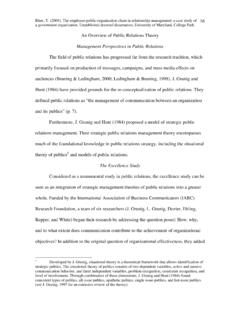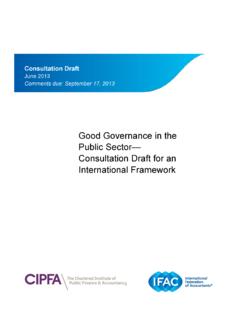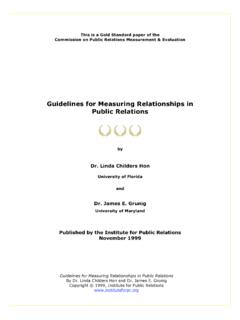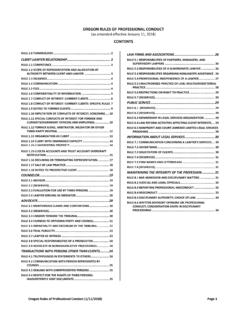Transcription of Characteristics of Effective Superintendents - NSPRA
1 Characteristics of Effective Superintendents A study to identify qualities essential to the success of school Superintendents as cited by leading Superintendents Project team members: Co-chairs: Louise Henry, APR Bonnie Reidy Committee members/interviewers: Candace Ahlfinger, APR Elise Shelton Kathy Toelkes Nicole Kirby George Held Judi Willis, APR Allison Westfall Jim Dunn, APR Cindy Gibson, APR Tim Hensley, APR Purpose This research project was designed to determine the contribution of good communications practices to the success of Superintendents who have been honored by their state or national peers as outstanding Superintendents and to gather the perceptions of these outstanding Superintendents regarding the value of communications to increased student achievement and superintendent success.
2 Background In 2004, prompted by the need to measure, assess and promote accountability in school communications, the National School public relations Association established the Communications Accountability Project, a many-faceted communications research project. In July, 2005, three research studies were launched. This report is the result of one of those research studies. The goal of the research described in this report was to interview or survey Superintendents who had been identified within the past five years by their peers as outstanding Superintendents through being named a state or national superintendent of the year or cited in an equally prestigious manner with the goal of gathering their perceptions of qualities and practices that contribute to their success as Superintendents . The personal and written interviews that comprise this research were administered from September 2005 through June 2006. Survey methodology The research team compiled a list of Superintendents across the nation who had been named superintendent of the year by their states or on a national level.
3 Seventeen Superintendents were interviewed by phone and/or e-mail. Questions asked in the interviews included: List three to five skills you define as the most important to your success as a superintendent , and rank each of these skills in order of importance, with one being very important, two being important, three being unimportant and four being least important. How important is communication to each of these skills? Do/did you have a professional communications leader on your senior leadership team? If you do not have a professional communications leader, from whom do you get your advice? How important is it to you to have someone to provide strategic communications advice? What impact does communications have on the success of moving your district s vision forward? Significant, some or none? Can you give one or two examples of when communications had a significant impact on the success of your district? Does communication play a role in improving student achievement?
4 If yes, tell me why? If not, why not? All questions were open-ended with no responses suggested to the respondents. Interviewers used prepared scripts and took copious notes. Fifteen Superintendents were interviewed in person or over the phone and two of the Superintendents chose to respond to a written survey instrument and complete the survey via e-mail. Open-ended questions were analyzed, categorized and ranked from most-frequent to least-frequent response. Questions that asked respondents to weight importance of an item were placed on a scale that corresponded with the possible points for the question. Responses were ranked in the following areas: skills for superintendent success; the importance of good communications; importance of communications advice; and the impact of communications on student achievement and moving the district forward. Survey results/key findings The need for good communications as an integral ingredient in superintendent success was cited by every superintendent in this study.
5 Although leadership, vision, and strategic thinking were listed as the most important skills for superintendent success, every superintendent in the study ranked good communications skills as a very important component of each of those skills. Several exceeded the top choice for the importance of communications by using terms like critical , crucial , or essential. Every superintendent in the study said good communications is essential to high student achievement. When these award-winning Superintendents were asked in an open-ended question to list three to five of the most important skills to succeed as a superintendent , 14 of the 17 specifically named communications or community relations . The only item listed more than communications was a combination of leadership/vision/ability to inspire staff/problem solver category, which was cited 16 times. Those who listed leadership and vision areas went on to say that good communications was a vital element for success in those areas.
6 Most important skills to success as superintendent Skill named Number of times named Leadership/vision/strategic thinker/problem solver 16 Communication (10) Community relations (3) 13 Interpersonal Skills 11 Character 10 Competency - curricular areas- support for public education 9 Supervisory Skills 3 Budget/finance 3 Organizational abilities 2 Flexibility/sense of humor 1 Continuous learner 1 Goal accomplishment 1 Intuitive-culture 1 Multi-lingual 1 Right staff in place 1 When asked how important communications is to each of the skills noted above, the only answers given by these Superintendents were that communications is very important, most important, critical, crucial and absolutely essential to the success of nearly every skill or quality named.
7 Importance of having a professional communications staff member Fourteen of the 17 Superintendents interviewed for this study have a professional communications leader on his or her senior leadership team or cabinet; two did not have a communications staff member and one has been in districts with and without a professional communications staff member. One superintendent who did not have a communications staff member at the time of the interview was in the process of conducting a search for the right person. He said, I need someone to report directly to me who is not a yes person, but someone willing and able to provide a different perspective - someone who sees everything from the community perspective. This is very important to me. Good PR people are not on every street corner. Sources of communications advice The fourteen Superintendents who have a communications staff member indicated throughout the survey their appreciation for the role of that person as an advisor and strategist.
8 The three Superintendents who did not have a professional communications staff member at the time the survey was conducted were asked who they turn to for advice. Rather than answering the question, one superintendent responded he intended to fight to get one (a communications staff member). Another superintendent , who now has a communications specialist on staff, said during the time she did not have a communications staff person she went to representatives from professional organizations and business leaders for advice. The third superintendent who did not have a communications staff member did not answer the question. Importance or strategic communications advice Sixteen of the 17 Superintendents responded to the question, How important is it to have someone to provide strategic communications advice? All of those who responded to the question expressed a need for strategic communications advice. They used language such as very important, extremely important, essential, really important and critical.
9 Typical responses were: ..best to have someone at the table then it s integrated. You must have strategic communications advice. Without it the vision goes nowhere. Without it in an urban environment, it will kill you. It is more than important, because you can t do without it. The superintendent can t be the only one doing the communicating. Everyone in the district needs to be trained to deliver the message. The communication leader has the duty to be part of the decision-making process, providing informed input to how decisions will be perceived and what should be done to accomplish the goal. The role of communications in realizing vision The sixteen Superintendents who responded to this question all said Effective communications has a significant impact on the success of moving the district s vision forward. Although the Superintendents were not asked to comment on this answer, one superintendent who had not had a communications specialist in the leadership team said, Our failures, when we did the autopsies, were caused by not having someone (communication specialist) inside.
10 Specific contributions of communications When asked to give one or two examples of when communications had a significant impact on the success of their districts, the item most cited by these Superintendents who had been identified by their peers for excellence (by being named superintendent of the Year or honored in another manner), was success in getting voter approval for bond referendum/levies. This was followed by communicating during times of change, with Superintendents citing changes such as No Child Left Behind and other accountability requirements; changes in curriculum; redrawing attendance boundaries; grade configuration changes; and closing schools. One superintendent responded, Critical need for Effective communications. Everything we do and did was about communications. I have to align what I say with what I do. We needed to let voices from all subpopulations be heard. Nearly 50 percent of the Superintendents who talked about the importance of communications in terms or marketing schools cited developing and carrying out complete communications/marketing plans; marketing plans for magnet schools; improving internal communications; and developing and maintaining Web sites.






